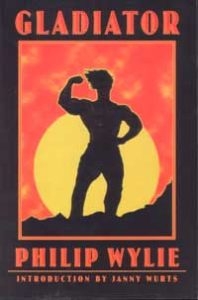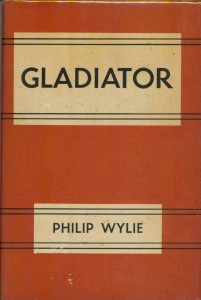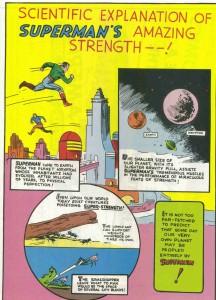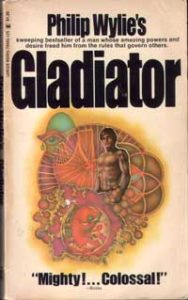
Throughout history, stories have frequently referenced men with abilities far beyond the norm — Heracles (Hercules), Gilgamesh, Samson, Beowulf — someone who can rise above the mundane and perform feats impossible for mortal man. In modern times, these themes have been returned to the forefront. With the advancement of technology in the 19th and 20th centuries, the idea of an enhanced human returned, this time through science instead of from magic or divine blessing, and disseminated into the public consciousness primarily through the written word, both in the form of novels and in pulp magazines. The natural extension of this was to add pictures, leading to the origins of the comic book super-hero, and particularly Superman.
Among the various pre-comic heroes of the early 20th century, many stand out — Doc Savage, Buck Rogers, John Carter of Mars, Tarzan, the Shadow — but one relatively obscure character may have had more of an influence than is generally recognized: Hugo Danner. Danner is the main character in Gladiator, a short, relatively obscure novel by Philip Wylie first published in 1930. While no direct evidence exists or was ever acknowledged by Jery Siegel and Joe Shuster that Superman was influenced by Gladiator, there are many striking parallels in the two characters’ powers and stories.

Hugo Danner’s story begins with Abednego Danner, a professor of Biology in Indian Creek, Colorado, whose experiments result in a formula that grants great strength, speed, and invulnerability when injected into a gestating fetus. His first experimental subjects were tadpoles, which manage to break out of their aquarium and smash his lab before suffocating in the air. His next experiment involved injecting a pregnant cat with the serum. The kitten, Samson, wreaks havoc on their home, and Danner is forced to poison it after it slaughters a fully-grown cow. When his wife, a domineering and extremely religious woman, announces she’s pregnant, Danner makes a fateful decision. Drugging her one night, he injects her with the formula and waits. Nine months later, their son, Hugo, is born — a healthy, if overactive, baby. It doesn’t take long before Professor Danner realizes his experiment worked. The infant begins to display great strength, destroying his crib and amazing visitors who catch a glimpse of what he can do. His wife is horrified at Abednego’s abominable act, initially condemning him, but amazingly accepting his rationale and doing her part in accepting and raising the child. The Danners decide to keep his abilities hidden, and Hugo is kept close to home, raised to respect law and morality, though there’s always the fear he may lose control and become a menace. Cautioned on this, young Hugo initially fears his powers, so he remains closed and withdrawn around other children when he begins school. Still, whispers and innuendo follow him wherever he goes. In an encounter with a bully in the schoolyard, six-year-old Hugo breaks the boy’s arm; at age seven, he lifts a two-ton wagon that had tipped over and trapped a man. At age ten, he heads off into the mountains one day and finally lets himself go, leaping forty feet in the air and smashing trees and boulders, finally overcoming the fear of himself that dominated his early years, and leading to a conversation with his father that may seem familiar:
“When you were little more than a mass of plasm inside your mother, I put a medicine in her blood that I had discovered. I did it with a hypodermic needle. That medicine changed you. It altered the structure of your bones and muscles and nerves and your blood. It made you into a different tissue from the weak fiber of ordinary people. Then—when you were born—you were strong. Did you ever watch an ant carry many times its weight? Or see a grasshopper jump fifty times its length? The insects have better muscles and nerves than we have. And I improved your body till it was relatively that strong. Can you understand that?”
“Sure. I’m like a man made out of iron instead of meat.”
“That’s it, Hugo. And, as you grow up, you’ve got to remember that. You’re not an ordinary human being. When people find that out, they’ll—they’ll—”
“They’ll hate me?”
“Because they fear you. So you see, you’ve got to be good and kind and considerate—to justify all that
strength. Some day you’ll find a use for it—a big, noble use—and then you can make it work and be proud of it. Until that day, you have to be humble like all the rest of us. You mustn’t show off or do cheap tricks. Then you’d just be a clown. Wait your time, son, and you’ll be glad of it. And—another thing—train your temper. You must never lose it. You can see what would happen if you did? Understand?”“I guess I do. It’s hard work—doin’ all that.”
“The stronger, the greater, you are, the harder life is for you. And you’re the strongest of them all, Hugo.”

The comparison of Hugo’s powers to the relative strength of insects was also used in an early explanation of Superman’s powers. Also, the moral code stressed upon Hugo by his parents, and his father’s counsel is another lingering touchstone of Superman’s history.
The story in Gladiator is much more complex, though. Throughout the book, Hugo struggles with his powers, alternately viewing them as both a blessing and a curse. For every triumph, there is a tragedy. Hugo graduates high school and leaves Colorado for Webster College, in the East. There, he finds a measure of acceptance and adoration as a star football player, though there is some jealousy from his teammates. It’s not to last, however. A momentary loss of control on the field leads to another player’s death, and a stricken Hugo leaves in the dead of night. He ends up as a deckhand on a cargo ship and later arrives in Marseilles just as World War I begins. He joins the French Foreign Legion, believing he’s found the perfect role for his abilities, and though he is a formidable foe — bulletproof, immeasurably strong, ruthless in battle — he realizes he cannot tip the balance alone, nor can he save his friends.
Following the war, Hugo returns to the United States, and for the rest of the novel, he struggles to find a place for himself in the world, but every job he takes, however he tries to help, he’s always either driven off in fear or becomes disgusted with the nature of the people around him. Eventually, he joins an archaeological expedition to Central America and finally finds an accepting friend in Professor Hardin, the leader of the project. Hardin reveals that while Hugo’s goals are noble, he cannot change the world alone — that instead of working to make change on his own, he should reproduce his father’s experiments and breed a new race that can use their powers to form an enlightened society of their own, one that would eventually supplant human civilization. Torn between the benefits and the risks of making more beings like himself, Hugo tears off through the jungle during a storm, raging against God, and apparently meets his end in tragic fashion.

All in all, the book is well-written and holds up well by today’s standards. The focus is not on Hugo’s abilities or what feats he can perform but in his quest to find his role in the world. Paradoxically, he finds the world is too small for him; yet he is frustrated by his impotence to make any real or lasting change in it. He grows restless quickly, always bucking against the constraints the world places around him. It’s a story of alienation. He struggles to find acceptance, but finds there is no one who can truly accept him for who he is. His teammates and co-workers grow to despise him, because they cannot match his strength, endurance, and work ethic, even when he’s concealing them. He craves love, but discovers there are no women who can return his passions to the same degree. He desires truth and justice, but inevitably finds corruption and opportunism.
This stands in stark contrast to the early Superman stories. Superman, who never seemed to worry about collateral damage, always maintained perfect control and took joy in his abilities. Superman is infallible; Hugo is flawed. The common threads between the two are in their powers, the need to conceal them, and their moralistic ideals and desire to make a difference. In many ways, Superman is a simplified Hugo Danner, with the addition of a secret identity to enable him to act to his full potential without facing public scorn or suspicion. Perhaps that’s the key difference in the two — with the bright costume and public persona, Superman is able to fearlessly stand out without engendering fear among the populace, to stand out as a champion instead of as a freak or possible threat.
So, was Superman based on Hugo Danner? The answer to that question may never be known. Siegel and Shuster never mentioned the book when they discussed their influences, though it’s entirely possible they had read it at some point. It was published in 1930, only a few years before they created Superman, and there are many similarities between the two characters’ abilities and the feats they perform. Still, the idea of people with superhuman gifts is as old as time, and by the 1930s, there were several characters in books, movies, and pulp magazines who the creators have described as inspirations, like Doc Savage and Errol Flynn’s Robin Hood. Ironically, while focus of the debate has been on whether Superman was based off of Gladiator, it could very well be that elements of the book have crept into the character over the decades as readers grew up and comics became more sophisticated. Superman has been shown in a more human light, and elements of the novel have been integrated into the mythos. On rereading the book, I found Hugo’s struggles more closely mirror the modern version of Superman than the early stories.
Read the book, it’s well worth it!
Next: This is supposed to be a site about comic books, right? So why am I spending time reviewing a novel? Well, next time, I’ll be looking at the various comic adaptations that have been produced over the years. In the meantime, you can download a copy of the book here for free, so enjoy!
Tom McNeely
tom@comicattack.net


Awesome article, Tom. I’ll definitely be reading this soon since it’s free! And I love stories like this, so I’m super excited. Thanks!
Brilliant article man!
That conversation you quoted also reminded me of the now almost cliche Spider-Man quote, “With great power comes great responsibility.”
Can’t wait for part II!!